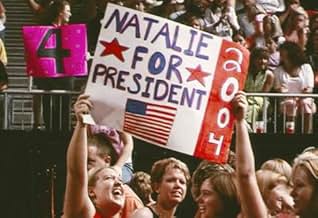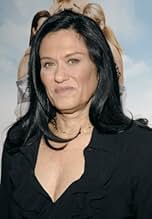A documentary on the The Chicks (formerly the Dixie Chicks) in the wake of singer Natalie Maines' anti-George W. Bush statement at a 2003 concert.A documentary on the The Chicks (formerly the Dixie Chicks) in the wake of singer Natalie Maines' anti-George W. Bush statement at a 2003 concert.A documentary on the The Chicks (formerly the Dixie Chicks) in the wake of singer Natalie Maines' anti-George W. Bush statement at a 2003 concert.
- Awards
- 8 wins & 13 nominations total
Emily Strayer
- Self
- (as Emily Robison)
Barbara Boxer
- Self
- (archive footage)
Aaron Brown
- Self
- (archive footage)
Pat Buchanan
- Self
- (archive footage)
George W. Bush
- Self
- (archive footage)
Dick Cheney
- Self
- (archive footage)
The Chicks
- Themselves
- (as Dixie Chicks)
Darlene Conte
- Self
- (as Darlene Kegan)
Anderson Cooper
- Self
- (archive footage)
Lewis Dickey
- Self
- (archive footage)
Rebecca Hagelin
- Self
- (archive footage)
Storyline
Did you know
- Trivia"Shut Up and Sing" is also the name of a best-selling book by conservative talk radio pundit Laura Ingraham. In her book, Ingraham skewers the Dixie Chicks and other musical acts who use their concerts and television appearances to voice their political opinions.
- GoofsNatalie is wearing a shirt that states "Dare to Be Free," in one shot the image is mirrored left to right. Evident in the text and her hair are reversed.
- Quotes
Natalie Maines: [after seeing someone with a sign that says F.U.D.C] I love your signs, but what have you got against Dick Cheney?
- SoundtracksSawblade
Composed by Didier Rachou
Featured review
In 2003, days before the US led invasion of Iraq, Natalie Maines, the lead singer of the Country and Western group the Dixie Chicks, announced to an audience of a concert in Shepherds Bush, London, that she was ashamed that the President of the United States was from Texas, which outraged rightwing groups back in their homeland. This film documents the band over the next three years through the pointlessly huge controversy Maines' comment created, and the anger and hatred levelled at them by their main fan base, the South.
A well made film, there is however a little unevenness about Barbara Kopple and Cecilia Peck's documentary, as although it was almost certainly begun and continued at least partly as a publicity film, what comes through is a very interesting piece on exactly what the First Amendment actually means to many Americans. And it's these parts that are the most engaging, as well as the most worrying. We are shown how a throw away comment made by a musician, someone of no real political importance, can get jumped on by media groups eager to forward their own agenda, and how the public will do whatever they are told to stay on the bandwagon.
What we see is an apparently inherent problem in how parts of America, mainly the Southern, "red" states have the attitude of 'You're Either With Us Or Against Us'. Let's face it, musicians using their music to protest a war is nothing new, but the fact that a Country and Western band, the genre of the South, dared to hold an opinion that went contrary to the idea that 'American Can Do No Wrong' seems to be so amazingly unconscionable to them that they have to react by totally ostracising them. Cue footage of rednecks burning CDs and calling for the Dixie Chicks to be executed for treason. Overkill anyone? What's seems strange is that the ideal of Free Speech, so integral in American politics and history, can be interpreted so wildly. As one protester puts it: "Free speech is all well and good, but sayings things about us in another country isn't right." Free Speech seems fine to them, as long as you don't say anything they don't want you to.
And on a further level it highlights an important issue in American politics nowadays, how it has become so polarised and as soon as something becomes political you seem to have to pick one of two opposing sides and stick to it. There seem to be a perception that there can be no shades of grey.
But slowly the film's focus moves back to the band and how they cope with their fall in sales and change of identity, from darlings of the South to political rebels and tries show, despite all this, they're still good ole fashioned Southern girls. At times you cynically realise that this is at least partly an attempt to win back their old fans, and you get the idea the band are trying to apologise without apologising; 'We're not going take back anything we said, but we wish we hadn't upset y'all. We need you to like us again.' And at times it does seem to be Natalie doing all the decision making. Admittedly it was her who made the original comment and most of the hate was focused at her, but band-mates Emily Robson and Martie Maguire seem to be just following her lead and wanted to just let it all go, with Maines taking it all personally and their manager, though with all good intentions, clearly seeing this as the best opportunity for the band to promote themselves globally. It would have been nice to see more opinion or interviews with the individual members to get their opinions rather than just footage from meetings showing Maines refusing to be apologetic again and again.
I think that Kopple and Peck have, almost seeming like they didn't mean to, have made a very interesting critique of the polarization of politics in America today and how the media sets agendas and public opinion, but once it moves on to how the Dixie Chicks are reidentifying themselves as a band in this new environment it just becomes a lot less interesting to anyone who wasn't already a fan of the band.
A well made film, there is however a little unevenness about Barbara Kopple and Cecilia Peck's documentary, as although it was almost certainly begun and continued at least partly as a publicity film, what comes through is a very interesting piece on exactly what the First Amendment actually means to many Americans. And it's these parts that are the most engaging, as well as the most worrying. We are shown how a throw away comment made by a musician, someone of no real political importance, can get jumped on by media groups eager to forward their own agenda, and how the public will do whatever they are told to stay on the bandwagon.
What we see is an apparently inherent problem in how parts of America, mainly the Southern, "red" states have the attitude of 'You're Either With Us Or Against Us'. Let's face it, musicians using their music to protest a war is nothing new, but the fact that a Country and Western band, the genre of the South, dared to hold an opinion that went contrary to the idea that 'American Can Do No Wrong' seems to be so amazingly unconscionable to them that they have to react by totally ostracising them. Cue footage of rednecks burning CDs and calling for the Dixie Chicks to be executed for treason. Overkill anyone? What's seems strange is that the ideal of Free Speech, so integral in American politics and history, can be interpreted so wildly. As one protester puts it: "Free speech is all well and good, but sayings things about us in another country isn't right." Free Speech seems fine to them, as long as you don't say anything they don't want you to.
And on a further level it highlights an important issue in American politics nowadays, how it has become so polarised and as soon as something becomes political you seem to have to pick one of two opposing sides and stick to it. There seem to be a perception that there can be no shades of grey.
But slowly the film's focus moves back to the band and how they cope with their fall in sales and change of identity, from darlings of the South to political rebels and tries show, despite all this, they're still good ole fashioned Southern girls. At times you cynically realise that this is at least partly an attempt to win back their old fans, and you get the idea the band are trying to apologise without apologising; 'We're not going take back anything we said, but we wish we hadn't upset y'all. We need you to like us again.' And at times it does seem to be Natalie doing all the decision making. Admittedly it was her who made the original comment and most of the hate was focused at her, but band-mates Emily Robson and Martie Maguire seem to be just following her lead and wanted to just let it all go, with Maines taking it all personally and their manager, though with all good intentions, clearly seeing this as the best opportunity for the band to promote themselves globally. It would have been nice to see more opinion or interviews with the individual members to get their opinions rather than just footage from meetings showing Maines refusing to be apologetic again and again.
I think that Kopple and Peck have, almost seeming like they didn't mean to, have made a very interesting critique of the polarization of politics in America today and how the media sets agendas and public opinion, but once it moves on to how the Dixie Chicks are reidentifying themselves as a band in this new environment it just becomes a lot less interesting to anyone who wasn't already a fan of the band.
- How long is Shut Up & Sing?Powered by Alexa
Details
- Release date
- Country of origin
- Official site
- Language
- Also known as
- Shut Up and Sing
- Filming locations
- Production company
- See more company credits at IMDbPro
Box office
- Gross US & Canada
- $1,215,045
- Opening weekend US & Canada
- $50,103
- Oct 29, 2006
- Gross worldwide
- $1,902,212
- Runtime1 hour 33 minutes
- Color
- Sound mix
- Aspect ratio
- 1.33 : 1
Contribute to this page
Suggest an edit or add missing content



































